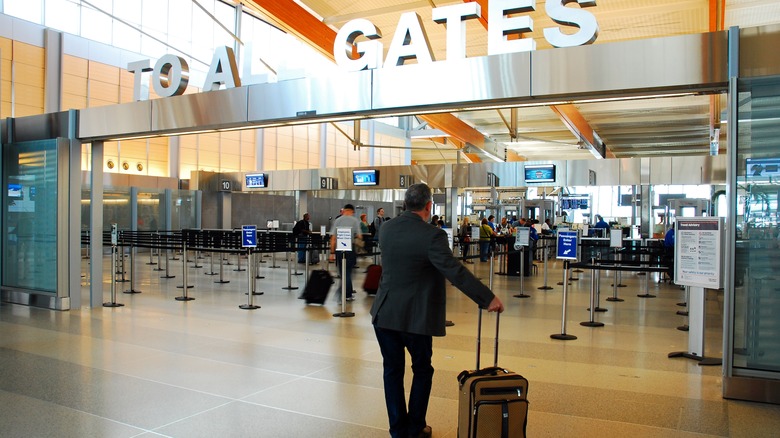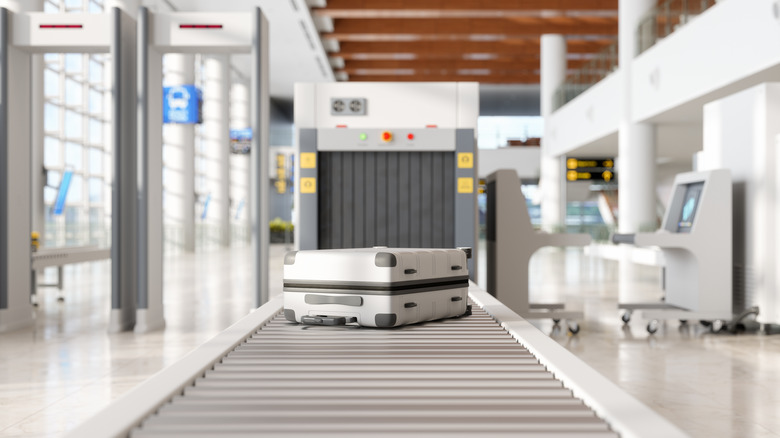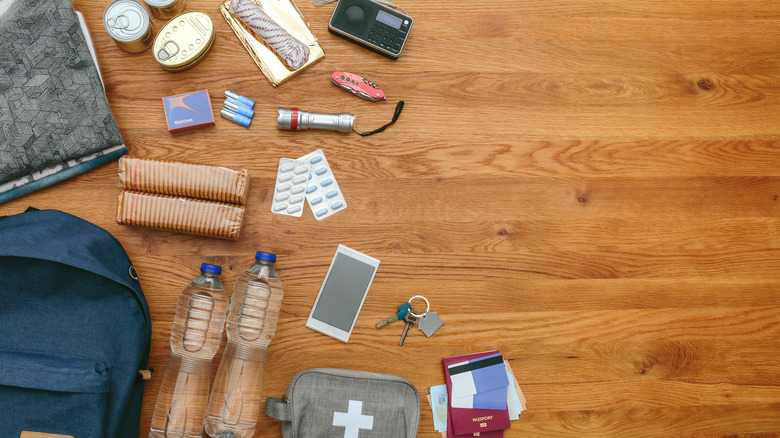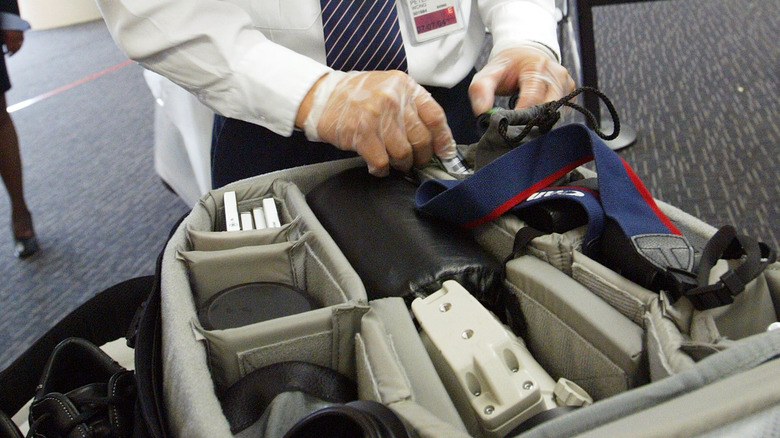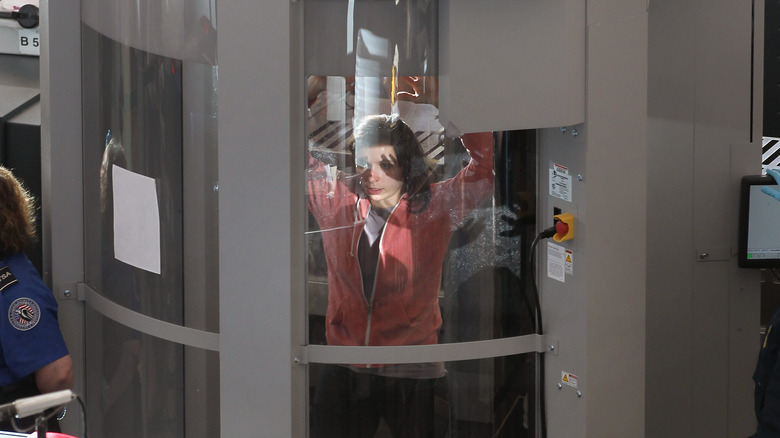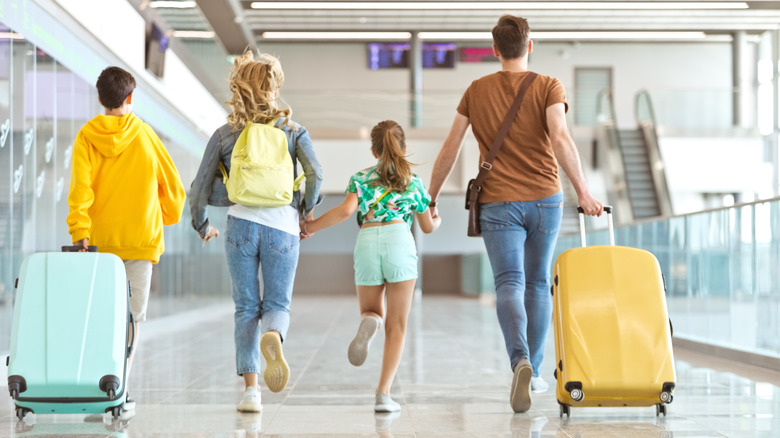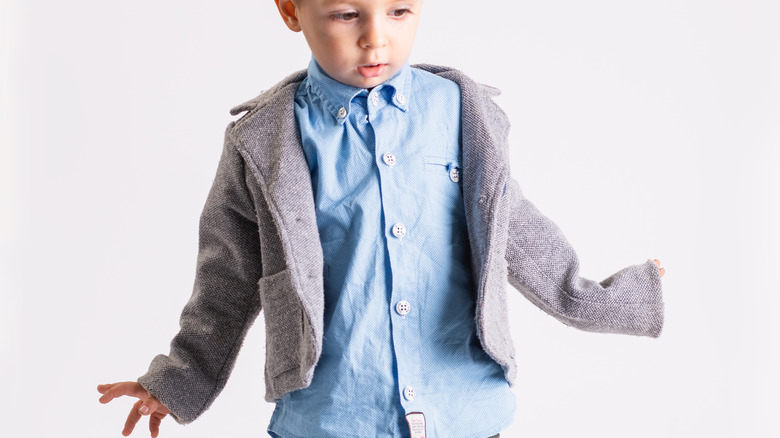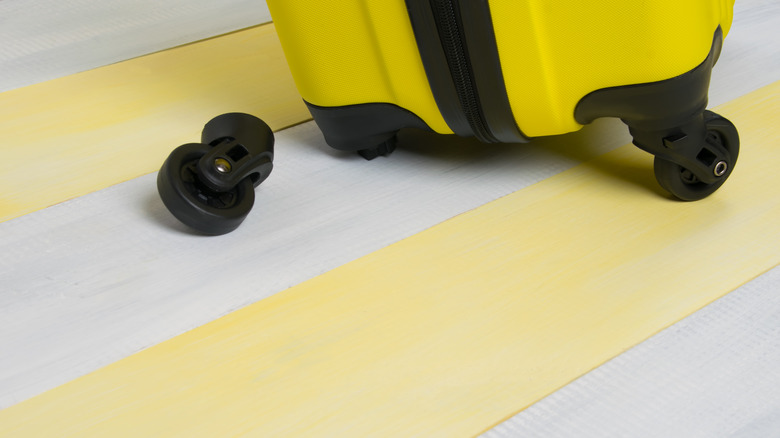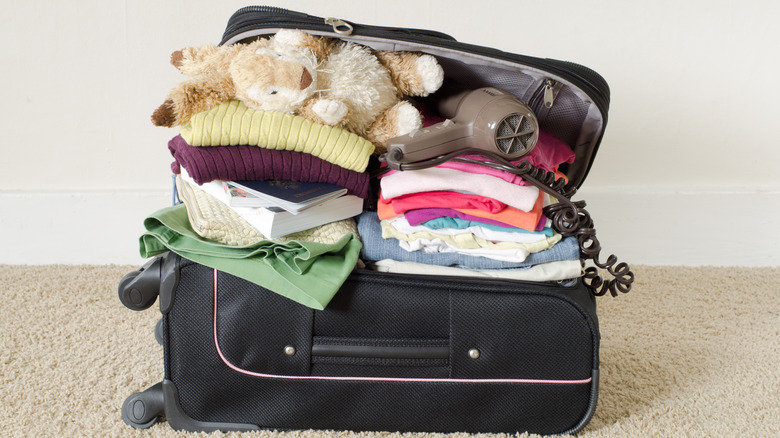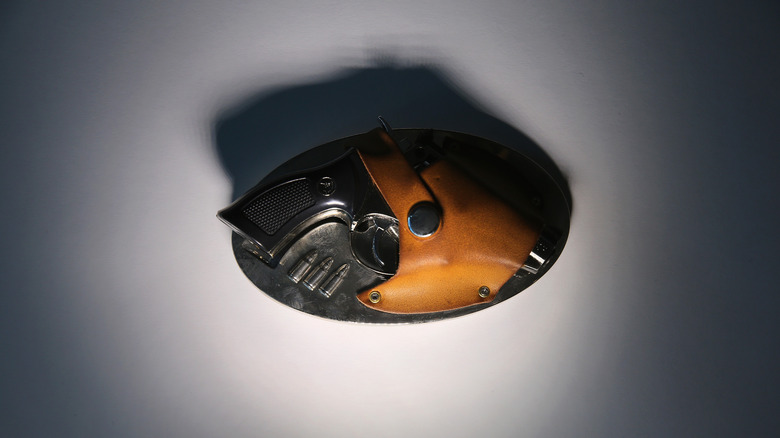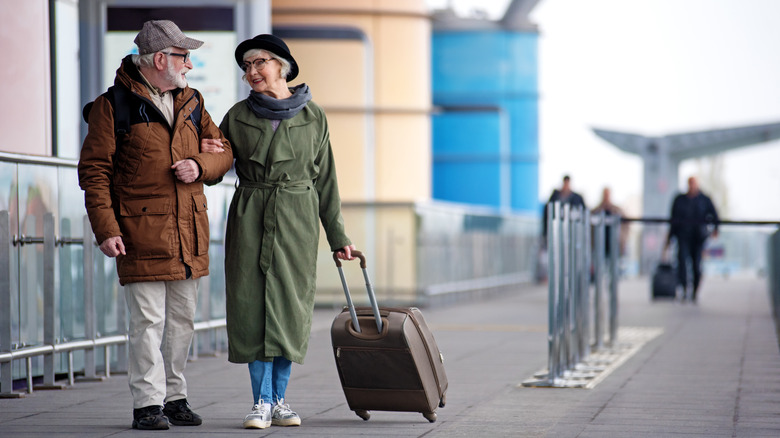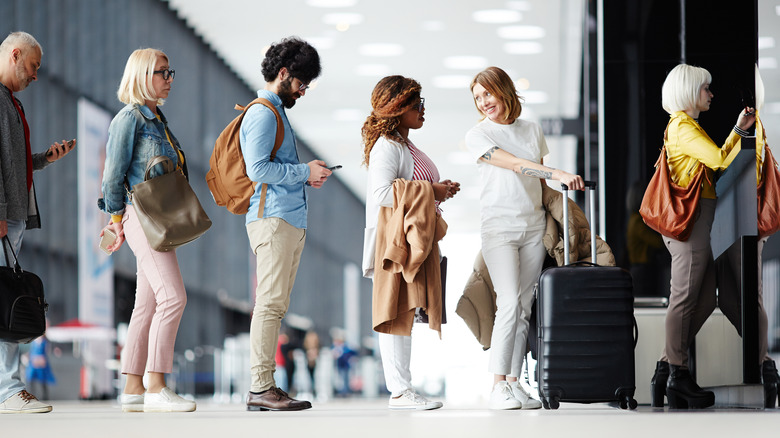The Absolute Worst Kinds Of Travelers You'll Encounter At TSA Checkpoints
Air travel is one of the best ways to get around. From international trips to short hops around your state or regional community, getting on a plane brings you to your destination faster and easier than nearly any alternative. Packing your bags and departing for the airport can be an exciting experience, but what comes next may not always be all that enjoyable. After checking in and dropping any bags that will be checked on board, there's the inevitable lineup procedure in the TSA checkpoint area. Taking certain items out of carry-on baggage, stripping off shoes and jackets, and perhaps even declaring some belongings to TSA staff are all features of this part of air travel.
One addition to this task that can drastically change the experience involves the people you happen to find yourself immersed in the line alongside. Plenty of travelers are looking to enjoy an uneventful transition from outside the secure departures area onto their airplane, but this doesn't always happen. From unexpected issues with technology and tools in the security line to the people standing in it, plenty of wrenches get thrown into the plans of travelers. These particular types of company found in TSA checkpoint lines can add that extra wrinkle to your travel plans, so choosing a different split in the line from them (when possible) might be your best bet.
Travelers engaged in illicit activity
It might seem like something that no traveler will ever encounter in person, but illicit activities take place in the light of day on a routine basis, especially in hub airports connecting people to a multiplicity of destinations. The United Nations notes the important role that airports play in the illegal behaviors undertaken by traffickers, organized criminals, and even those engaged in terrorism. In May 2024, four New York-based flight attendants were arrested for their role in smuggling drug profits out of the country. Likewise, in 2020, 765 individual drug seizures took place in airports across Western Europe, resulting in the confiscation of nearly 7 tons of drugs in total.
It can be hard for a typical bystander to identify someone engaged in smuggling or any other kind of illegal activity, but TSA agents are trained to scour security lines. They're on the lookout for telltale signs of misdeeds like compulsive talking, sweating, or a suspiciously averted gaze. Unfortunately, if you happen to be unlucky enough to be standing in line near someone caught doing something illegal (rather than breaking a rule or accidentally bringing something they shouldn't through the airport), you may end up waiting quite a bit longer. Finding illegal substances or uncovering a plot of some sort often creates a scene that can grind the line to a standstill.
The honest rulebreaker
Unlike the money smuggler, recreational drug user, or any other type of traveler engaged in illegal activity, there are plenty of honest rulebreakers who bring something along for the trip that they shouldn't. A set of nail clippers that includes the pointed nail file is a great example of this. In the heat of the moment, it can be easy to forget that your clippers include the feature. Similarly, many people routinely carry small pocket knives or multitools that include a short blade and forget to leave them at home when flying. These will slow the line down temporarily as staff have to identify the object in question and either clear it to travel with the passenger or take it away from them.
I have personal experience with another vein of this kind of travel issue. Years ago, I bought a small pair of locking pliers while at home visiting family so that I could change the propane tank in my apartment without issue (living in Oman, I couldn't find a pair locally). This caused a bit of a backup in the security line as the TSA agent who looked through my things had to measure the pliers and ultimately decided they were short enough to keep. However, most tools nowadays aren't allowed in carry-on luggage and will certainly result in the same kind of time-consuming slog — even if the implement is eventually deemed fit to fly alongside its owner.
The gearhead who follows every rule to the letter
Forgetful travelers or those who might be ignorant of specific prohibitions on items aren't the only potential hazards standing between you and your gate. People who take the rules seriously can sometimes cause a holdup, too. Those who travel with quite a bit of gear can actually be slower through the checkpoint than a traveler who simply forgets to take something out or off.
Photographers, for instance, might be traveling with one or more digital cameras — all of which must come out of the bag and be scanned individually — a cell phone or two, a laptop, and a tablet. There might even be peripheral gadgets that come along with all this equipment, which may need to be examined by TSA agents outside the carry-on bag. With this much extra heft sliding through the scanners, travelers going through the checkpoint behind a major gearhead can end up with quite the impatient headache.
Travelers who refuse to be scanned
The argumentative types looking to challenge the divergence of 'policy' from 'law' certainly have a place in society. These kinds of challenges to authority are an important — if sometimes obnoxious — pushback against overreach of all sorts. From corporate decrees that leave consumers in the lurch to police interactions that unconstitutionally delay or even injure citizens just trying to live their lives, these kinds of challenges highlight systemic issues on a regular basis.
One space that's rife with issues is the TSA line. Sometimes, it can feel that TSA security efforts simply do not work to defend air travelers against the specific threats the organization was created to prevent: Acts of terrorism in the skies. As a result, it can be incredibly easy to get annoyed by a normalization of performative dehumanization at the hands of the administrative state. To top it off, Darryl Campbell of The Verge calls TSA "one of the most vindictive and hostile workplaces in the federal government." But TSA checks do effectively curtail smuggling, human trafficking, and many other issues. No matter your feelings on the value of TSA checkpoints, no one wants to stand in line behind an argumentative individual on a crusade against the federal agency (perhaps aggressively declining a pat down and other security screening measures). This conflict — even without escalating into a full-blown scene — can slow down the progress of all other passengers and create a majorly uncomfortable environment to wait in.
The late and panicking traveler
This one's primarily an issue if they are standing behind you, although a panicking traveler adds a measure of stress to the entirety of any line. These travelers often expect everyone in front of them to move out of the way to accommodate their lateness. Sometimes, a traveler finding themselves in a rush can't be helped, and you'd hope that other people would lend a hand if it were you in that position. However, there's no real concrete way to separate poor planners from those affected by detrimental circumstances. I've fallen victim to forgotten laptops (my own fault), punctured tires on the way to the airport, and the freak middle-of-the-night-stolen-car-strikes-billboard accident that closed key roads at the crack of dawn (true story). All of them created substantial panic, but none ultimately resulted in a missed flight.
Late arrivals can also initiate the classic, frantic dash through the airport and an exasperated wait in the security line. These travelers place a strain on others around them, both in their desperate need to skip the line and the overwhelming stress they exhibit, even when jumping the line to speed off toward their gate. The stressful atmosphere isn't something that just dissipates after a traveler leaves your presence, so these kinds of flyers can have a real impact on your experience during and directly after you encounter them in the TSA checkpoint area.
Overdressed travelers
Travelers have grown accustomed to the mandatory partial undressing that takes place at TSA checkpoints. Shoes, jackets, hats, and other articles of clothing must be taken off in order to proceed through the scanners. This has led many to minimize their clothing to streamline the process. No one wants to stand in line longer than they have to, and a pair of slip-on shoes can speed up this part of the experience by a crucial minute or two. However, business travelers might not always be on the same page as those speed demons in the line. Suit jackets, lace-up dress shoes, and other staples of a typical business outfit — an overcoat and scarf, perhaps for those traveling in the wintertime — add serious time in both disrobing and redressing. Ultimately, this can create a dramatic slowdown for passengers standing behind, even if it only feels like a glacially slow transition from one side of the checkpoint to the other.
Another overdressing culprit that all travelers will know and dislike is the traveler hoping to skate around the skint packing rules that have become mainstream. Wearing boots, jeans, long-sleeve-shirt, hoodie, and a puffy jacket might be an effective way to avoid packing your heaviest items in a size-restrictive bag. However, this practice also leads to quite a delay at the TSA line.
Broken luggage carriers
Broken suitcases make travelers disjointed and annoyed, and that's why so many people purchase quality luggage with a decent lifespan. Dragging a stubborn bag through the airport creates a fight that puts a flyer on edge throughout their entire trip inside the airport halls. Whether it's a wheel that's come off in transit or a busted handle that makes pulling the bag a disastrous experience, problems with baggage often turn even the most relaxed adventurer into a moody and brooding malcontent when they enter the security line and come into contact with one of many other kinds of travel nuisances. This off-putting mood might pique a TSA agent's interest and slow the line down by initiating a longer check.
A bag with broken wheels might also move around with a mind of its own. These bags don't always sit still when the carrier stops moving, and they might end up banging into other people or their things. All in all, a broken piece of luggage creates an odd liability and mindset that can quickly leech out and affect many other people in the security line and elsewhere.
Passengers who stuff their suitcase to its breaking point
Inevitably, the traveler who has somehow managed to pack their entire life into a single carry-on suitcase is the person who will be randomly selected for additional screening. It is no great shock, as jam-packed suitcases can sometimes appear on scanners' screens with a variety of potentially problematic areas of interest. The sheer volume of stuff and the compression required to get a bag like this closed may lead to questionable masses inside the bag when it finally reaches the X-ray machines. As a result, TSA agents might be overtly interested in these kinds of bags more frequently.
Shockingly, the process of repacking a carefully closed bag that's been meticulously overpacked is even harder to recreate in an airport setting than it was at home. Therefore, a traveler carting around a hefty carry-on may ultimately take up quite a bit of real estate at the tail end of the security area trying to repackage their luggage. They may end up getting in the way and slowing down plenty of other travelers as they make their way through the TSA checkpoint.
The firearm carrier
Perhaps surprising to some, firearms are allowed onboard flights under very specific circumstances. Loaded and situated in a carry-on bag is far from conforming, however. In 2023, Georgia's Hartsfield-Jackson Atlanta International Airport (ATL) topped the list for the most firearms confiscated by TSA agents (448 in total of the more than 6,700 across the country). If you bring a gun through the TSA checkpoint, you almost certainly will be identified, and potentially severe legal consequences will follow this seizure. Travelers and their confiscated weapons will be passed on to local law enforcement, and a fine, jail time, or both is likely to follow, even when the weapon was brought through security by accident. If you are looking to bring a gun along with you while you travel, it must be secured in a hard-sided case and locked in your checked baggage. You will likely also need to take it out to verify these security features for the check-in agents.
A found firearm in the TSA security checkpoint area naturally raises the alarm and freezes proceedings. It's not uncommon for multiple TSA agents to be pulled off whatever job they were assigned to deal with the threat, leading to lane closures and a halt to the flow of travelers. During times of busy travel (holidays, peak hours of the day, and the like), this can create a major backlog that slows progress for hours afterward.
Older travelers
Even though some older passengers aren't required to take off shoes and jackets (among other loosened rules), they can still create a bit of a slowdown for other travelers. Older passengers may be a little slower when moving through the line and might even require assistance putting their luggage on the conveyor belt to be scanned. As with some other travelers on this list, if you were in that position, you'd hope that someone else would stop and help. However, that reality doesn't change the fact that an older person can create a bit of a backlog for other travelers around them.
The only thing you can do when standing in line with a flyer who has reached their golden years and might be struggling is to remember to be patient. You hope to be standing in their shoes one day, so it's important to keep your cool and realize that these things are unavoidable and aren't all that annoying anyway. Of course, many elderly travelers are better at this than young bucks, so don't make any assumptions.
The incensed flyer
There will inevitably be a passenger who is just angry when you find yourself waiting in the TSA line. It might be the result of a long wait time for checking in or a crisis going on in the background of their daily life, but the output is the same nonetheless. These travelers make everyone around them uncomfortable and can warrant additional screening, which adds precious time to the procedure. Much like the attention that nervous passengers receive from watchful TSA agents, angry travelers also raise red flags. Even if they aren't deemed to be a threat of some sort, overly angry passengers are carefully studied by the crew at a TSA checkpoint throughout their time in the area. Additional security measures can certainly slow the progress of a TSA line, affecting everyone else waiting to board their flight.
The off-putting nature of an angry traveler is often far more disruptive for other people seeking to simply get on with their voyage. A person yelling at someone on the phone or a quiet, simmering anger on a traveler's face creates a seriously hostile environment for everyone around, and it puts every traveler on edge right alongside the hypersensitive TSA screeners and the incensed flyer themselves. This kind of traveler is bad for everyone, so if you happen to be stewing over something troubling, try thinking about something positive instead in order to streamline your experience and that of your fellow travelers.
Incessant talkers
You might be a social butterfly who could talk to anyone for hours on end, but at 3 a.m. before a red-eye, even the most talkative individual likely wants nothing more than to quietly and uneventfully schlep their way through the security procedures and just get on their flight. Nonstop talkers often seem to strike at the worst possible moment — just like this one. You might also find yourself behind a chatty traveler while inching your way through an incredibly long line.
No matter where you find the incessant talker, this kind of passenger often gets old in a hurry. In reality, there's only so much talking that one will want to reasonably engage with when it comes to a stranger. These passengers can be a small nuisance in certain circumstances and a true terror when a variety of other factors come into play. Too much chatter when you are tired, have a headache, or are busy thinking about a million and one other things going on in your life can really add stress to a trip. It's also a great way to get spotted by TSA agents on the lookout for strange behaviors. Overly talkative passengers are immediately noticed by security personnel and may even be selected for additional screening. Getting unlucky enough to have someone talking to you throughout the security line can result in you being pegged as a chatty Cathy, too!
